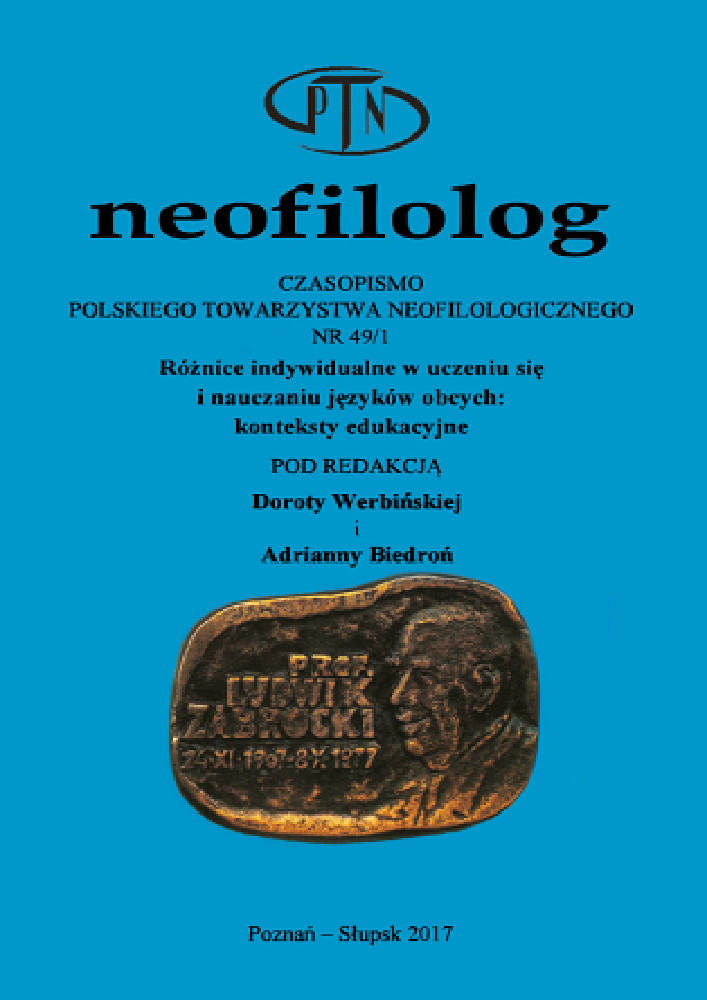Résumé
School achievement in foreign languages is often reported in mean scores, or on normalized scales, where schools are compared with each other and against a national average. This has led to the common belief that rural lower secondary schools in Poland are ‘worse’ than schools in larger centres of population. This paper sets out to demonstrate that such a view is erroneous as it fails to take into consideration the context, either at the level of the school as a whole, or at the level of individual learners. Based on data obtained from the first two years of a large scale longitudinal research project, “Teaching and Learning Foreign languages” (BUNJO 2012, 2013), this case study describes the context of one lower secondary school in a village in the east of Poland and profiles four teenage learners (aged 13-14) who attend this school and their achievement in English over the period of one year.
Références
Dörnyei, Z. 2005. The Psychology of the Language Learner: Individual differences in second language acquisition. Mahwah, NJ: Lawrence Erlbaum.
Dörnyei, Z. 2009. “Individual differences: interplay of learner characteristics and learning environment.” Language Learning, 59(1), 230-248.
Duckworth, A. L., Peterson, C., Matthews, M. D. & Kelly, D. R. (2007). “Grit: Perseverance and passion for long-term goals.” Journal of Personality and Social Psychology, 92(6), 1087-1101.
Dweck, C. 2006. Mindset: the New Psychology of Success. New York: Ballantine.
Gardner, R. C. 2006. “Motivation and Second Language Acquisition.” Paper based on address given Seminario Sobre Plurilingüismo: Las Aportaciones Del Centro Europeo de Lenguas Modernas de Graz, on December 15, 2006 at the Universidad de Alcalá, Spain. http://publish.uwo.ca/~gardner/docs/SPAINTALK.pdf.Accessed 2.01.2017.
Gardner, R. C. 2010. Motivation and Second Language Acquisition: The Socio-Educational Model. New York: Peter Lang.
Higgins, E. T. 1998. “Promotion and prevention: Regulatory focus as a motivational principle.” Advances in Experimental Social Psychology, 30, 1-46.
Markus, H. R. & Nurius, P. 1989. “Possible selves.” American Psychologist, 41, 954-969.
Mercer, S. & Ryan, S. 2010. “A mindset for EFL: learners’ beliefs about the role of natural talent.” ELT Journal 64 (4), 436-444.
Norton, B. 2001. Non-participation, imagined communities and the language classroom.” In: Breen, M. P. (ed.), Learner Contributions to Language Learning. Harlow: Pearson Education, pp. 159-171.
Sutherland, A., Ilie, S. & Vignoles, A. 2016. Factors associated with achievement: Key Stage 2. Rand Europe/Department for Education. https://www.gov.uk/government/uploads/system/uploads/attachment_data/file/473674/RR486_Factors_associated_with_achievement_-_key_stage_2.pdf. Accessed 2.01.2017.
Ushioda, E. 2009. “A person-in-context relational view of emergent motivation, self and identity.” In: Dörnyei, Z. & Ushioda, E. (eds.), Motivation, Language Identity and the L2 Self. Bristol: Multilingual Matters, pp. 215-228.
Ushioda, E. 2011. “Language learning motivation, self and identity: current theoretical perspectives.” Computer Assisted Language Learning, 24, 199-210.
Waters, T., Marzano, R. J., McNulty, B. 2003. “Balanced Leadership: What 30 Years of Research Tells Us about the Effect of Leadership on Student Achievement. A Working
Licence
© Melanie Ellis 2017

Ce travail est disponible sous licence Creative Commons Attribution - Pas de Modification 4.0 International.
Auteurs :
Les auteurs de textes acceptés pour publication dans la revue Neofilolog sont tenus de remplir, signer et renvoyer à l'adresse de la rédaction, un accord sur l'octroi d'une licence gratuite pour les œuvres, avec obligation d'accorder une sous-licence CC.
En vertu de cet accord, les auteurs des textes publiés dans la revue Neofilolog accordent à l'Université Adam Mickiewicz de Poznań une licence non exclusive et gratuite et permettent l'utilisation de la sous-licence Creative Commons Attribution-NoDerivatives 4.0 International (CC BY-ND 4.0).
Les auteurs se réservent le droit de disposer librement de l'œuvre.
Utilisateurs :
Les utilisateurs d'Internet intéressés ont le droit d'utiliser les œuvres publiées à partir de l'année 2017 sous réserve des conditions suivantes :
- reconnaissance de la qualité d'auteur - l'obligation de fournir des informations sur la qualité d'auteur, le titre, la source (liens vers l'œuvre originale, DOI) et la licence, ainsi que l'œuvre distribuée ;
- sans créer d'œuvres dérivées - l'œuvre doit être conservée dans sa forme originale, p. ex. les traductions ou les interprétations ne peuvent être distribuées sans le consentement de l'auteur.
Tous les textes publiés sont soumis au droit d'auteur.
Autres :
L'Université Adam Mickiewicz de Poznań se réserve le droit à la revue dans son ensemble (mise en page, forme graphique, titre, conception de la couverture, logo, etc.).
.
